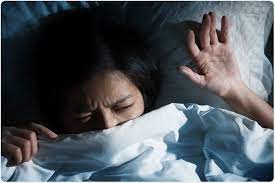
It is an easy jolt out of bed when you hear your child screaming after they hear a sound or see a monster under their bed. After all, children have wild imaginations. But nightmares are not only a frequent occurrence in young children. For adults, 50-85% experience nightmares occasionally with only about 2% having nightmares that disrupt sleep.
Identifying what a nightmare is for an adult is a first step alongside disorder characteristics.
Types of Nightmares
The American Academy of Sleep Education (AASE) classifies two types of nightmares: idiopathic and secondary.
- “Idiopathic nightmares usually only appear during a short period of time when you are experiencing high stress or emotional instability. This type of nightmare usually ends after the stressor is resolved.
- Secondary nightmares are related to a medical condition (such as trauma), a mood or psychiatric disorder (such as anxiety, depression, or personality disorder), substance abuse or medication use/withdrawal, or a sleep disorder (such as obstructive sleep apnea (OSA), REM sleep behavior disorder, or nocturnal seizures).”
Nightmare Disorders
According to the International Classification of Sleep Disorders (ICSD), a nightmare disorder is classified as parasomnia usually associated with rapid eye movement (REM) sleep. While only 4% of adults are diagnosed with a nightmare disorder, some common characteristics in patients include mood swings, fatigue, behavioral problems, daytime sleepiness, impaired occupational or interpersonal function, bedtime anxiety, or cognitive impairments.
“The AASM task force found that various methods may be used for treating nightmare disorders, including cognitive behavioral therapy, hypnosis, and some prescription medications. However, the task force concluded that the anti-anxiety medication clonazepam and the antidepressant venlafaxine are not recommended for the treatment of nightmare disorder.”
Long-Term COVID and Nightmares
Anytime a person is faced with a stressful situation, nightmares can add to their anxiety. COVID also contributed to irregular sleep routines and insomnia which adds to a disrupted sleep cycle.
New studies are finding links between insomnia and long-term COVID effects. Sleep Score Labs defines long term COVID as a general phrase used “to describe signs and symptoms that persist long after the time of original infection (beyond approximately 3 to 4 weeks). These long-term symptoms include a wide range of health problems – some mild, some severe – that are new, returning, or ongoing.”
Studies will continue to define more connections between the two but approximately 30 percent of long-term COVID individuals have reported lingering sleep difficulties with insomnia diagnosed in about 5 to 10 percent of patients.
The increase in nightmares from those who suffered from long-term COVID could be connected to the traumatic experience associated with the virus and treatment. Researchers believe these nightmares may be “an attempt to cope with negative emotions” related to COVID.
Post-traumatic stress disorder (PTSD) studies also show an increase in nightmares among adults including veterans. The U.S. Department of Veterans Affairs reports 71-96% of PTSD veterans may have an increase in nightmares.
Altogether, nightmares are not only an issue with children. As adults, it is important to keep track of any health issues including negative effects caused by a lack of sleep. Remember that talking to your physician or psychiatrist is important to find if your frequent nightmares are uncommon.
If you are in a pattern of sleepless nights that are negatively affecting your health, your family, or your career, connect with the Alaska Sleep Clinic for a free consultation. Our sleep medicine specialists offer the help needed to get back on track with a quality, healthy night’s sleep.







